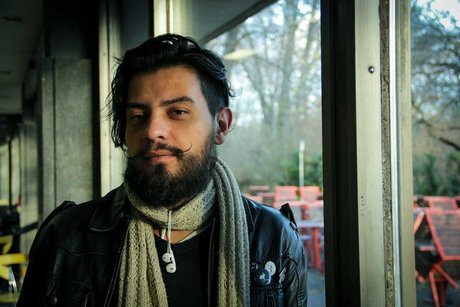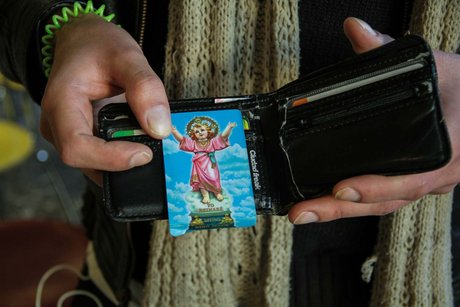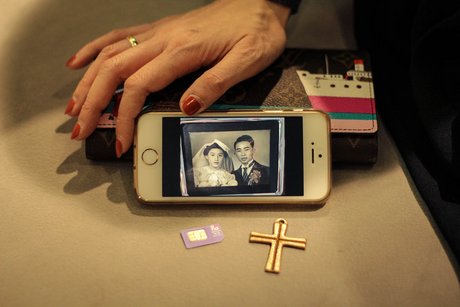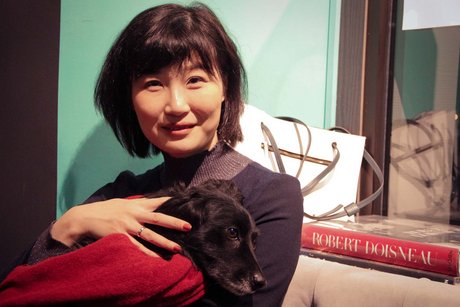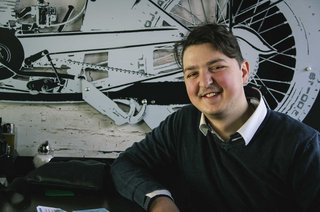The idea behind my project was to get an insight on people’s lives in a more personal matter. By asking foreigners why they came to Germany and then showing me the contents of their wallets, I felt this project could dig deeper into who a person is. The wallet is a very personal article. Our whole life can be altered by it. Our wallets hold credit cards, ID cards, money, pictures of people, notes, religious pieces and more. They travel with us daily. It can be a source of happiness and of pain.
At first, I thought this would be an easy project. How hard could it be to stop and ask people about their lives? I realized after spending two hours at the Berlin Christmas Market that this wasn’t going to be an easy task. People were hesitant on speaking about themselves, and even more afraid of presenting their wallets out in front of me. I had the feeling they thought I was going to steal them. In the end, I managed to not get a single person to open up to me. I thought about what I may have done wrong and came to the conclusion that asking a stranger to share personal belongings with me was the wrong way to go about it.
I decided to ask the support of my friends by getting them to ask their friends. I explained to them the significance of the project and showed examples of what I wanted to achieve. I traveled to 8 different cities during Christmas to interview people personally and ask them about their experiences in Germany. Eventually, I began receiving more interviews than I could handle. Some stories were filled with hardship, some with joy – but the one thing they all had in common was that everybody had something to show. Not every person I asked kept items in their wallets. Some people didn’t use wallets anymore. “The phone is the new wallet; I can show you my whole life on my phone if you want” somebody offered. Phone or no phone, I then began realizing the title of my project, Hidden Portraits became more than just the hidden pictures people kept in their wallets. When I interviewed Asmaa, her story was about love and the struggle that women face in Iraq. She didn’t have something in her wallet to show, but I realized that Asmaa herself was the exact definition of what Hidden Portraits meant to capture. Her identity in Iraq was covered up but in Germany it was open. Asmaa didn’t need a picture or item in her wallet to show, she herself had been a hidden portrait.
I think the best explanation for what I learned about during this project comes from the made up word sonder, from John Koenig. John Koenig’s project The Dictionary of Obscure Sorrows attempts to make up new words for emotions that presently lack words. In any case, whether it’s the word sonder or my interview with Asmaa, the idea of my project was realized and I am happy to present it to you here. I hope you read and enjoy the stories as much as I did. Germany is a great country filled with vibrant beings who helped create the atmosphere that made these stories possible.
Leonardo Hermel
Porto Alegre, Brasil
Generations back, my family immigrated from Germany to Brazil. One of my great-grandmothers was born on the ship coming to Brazil. It took months for the boats to travel the Atlantic so the question we often asked ourselves was »Where was she born? Is she considered Brazilian or German?« When immigrants came, they had to register in the churches, so many documents over time were lost to fire or destruction. We don’t know anything about the history of our family. The only thing I ever found was a list of passengers aboard the ship where the family name »Hermel« originated from Sachsen. My family now lives in South Brazil, but perhaps it’s a hint to where I am descended from.
This thing in my wallet is quite interesting. I was traveling in Brazil to Rivera which borders Brazil and Uruguay. People go there to buy stuff because it’s cheap. I was on the street when a gypsy came up to me. This woman wanted 5 R$ for a pair of socks (Real = Brazilian currency, which is close to 1 Euro), so I thought why not, and I gave her 10 R$, expecting 5 R$ in exchange. Instead of getting my change back, this woman started talking to me and gave me this pouch. I don’t know what’s inside of it, but she put it directly in my hand and said, »You will make a lot of money, and when you do, you come back here and give me 50 real.« That was 5 years ago, but I still remember her name was Juanita. I thought it was really kind of crazy, but later that year I got this really great job where I made lots of money which enabled me to come to Germany. It’s my goal when I go back to Brazil now to travel back to Rivera and give her the money. I know she will remember me.
Berlin, Germany
Ashley Clark
Orange County, USA
I’m a PhD student doing research on Goethe, particularly on Goethe’s theatre. I’m able to access the archival material here but also to walk where Goethe walked. As a historian, I find you get a deeper understanding of the person and of what they felt when you can walk in their footsteps.
I’m happy to be here – it’s a contentious crazy time in the states because of the elections, so it’s nice to have some distance and perception. I feel lucky to have an understanding of the German culture already. My mother is Austrian and I lived for sometime in Austria (also during another US election). I did my undergraduate exchange in Göttingen and spent three months at the Alexander Humboldt University in Berlin doing research. I miss the ease of communication and I miss my family – it’s difficult to know the distance when something dramatic happens in your home country.
(Top left) This is a picture of my grandparents. It’s Austria, 1944 and they were just married. My Oma was pregnant with my mother. My Opa went to war but never came back, so he never met my mother.
(Top right) This is from 1959 and it is of my other grandfather Keith who passed away two months ago (October 2016). He was a folk musician and was good friends with Pete Sieger and Odetta. He helped shelter them during the McCarthy era in Illinois.
(Bottom right) The two kids are my brother and myself. I’m about a year and a half old. We don’t talk very often, but it doesn’t mean I don’t miss him.
(Bottom left) This picture is the most recent. It’s my best friend who is a sister to me and her daughter, who is the first child that I actually like. I’m an aunt to her and I’m sad to miss the times I don’t get to see her grow up. It’s the first thing in Becca’s life I’m not a part of.
Weimar, Germany
December 2016
Khaliqyar Ahmadi
Panjshir, Afghanistan
I don’t have anything in my wallet,I lost it all when I came to Germany. The one thing I do have is this picture of me. That’s me on the right, giving a speech at my graduation ceremony from the police training I did in Turkey for 6 months.
When a person doesn’t have money in Afghanistan, or know someone with the authority of a good official, you can’t get a good job. The system is corrupt. The government will send you to a dangerous place. Without status, you can’t be assured safety. When I was back in Afghanistan, I worked in Kandahar. I am not exaggerating when I tell you that all of Afghanistan is dangerous. When you go from one province to the other, the route is filled with insurgents, the Taliban, ISIS. Everyday there are police killings – police are being targeted more than civilians. Because the borders in Afghanistan are open, insurgents are able to enter from foreign countries and often they are more powerful than the police. They have good weapons, more influence – when you’re trying to stay alive it’s a bad situation to be in.
After working in Kandahar, I wanted to study. It has been my ambition since I was a child to go to university and become a doctor. I wanted the ability to work and study, so I tried to change from Kandahar to Kabul, but because my family doesn’t have any connections with the jurisdiction, the government sent me to Farah, which is one of the most dangerous provinces in Afghanistan.
I came to Germany to be safe. I can learn here. Every person can have an ambition in which they can achieve. The security is very good. Without security we cannot learn, we cannot work, we cannot do anything. Now it is my ambition to learn German. I fear that if I don’t learn German, they will send me back to Afghanistan. I didn’t come here to do nothing, I came here because I wanted to have a safe life
Refugee camp Killesberg, Stuttgart
December 2016
Dana Cohen
Tel Aviv, Israel
Being a Jew from Israel, I often get asked how I feel about living here, because of Germany’s history with the Jews. Let me tell you: I enjoy my life here. My studies are great, I’ve met amazing people and I’ve also learned a lot from the Germans.
I get it when younger German’s don’t associate themselves with the Holocaust. They didn’t do it, that wasn’t them. It’s the same thing I get when people associate the turmoil that is happening in Israel to me. That’s isn’t me. It is important though, to understand what is going on. You don’t have to feel bad for something you didn’t do, but it also isn’t an excuse to not learn about it. The Holocaust is an important historical event that we need to remember. With genocide still happening today, it is even more relevant to educate ourselves about it.
The things I carry in my wallet are kind of like lucky charms. I don’t really look at them, it’s just nice to know they’re there. There’s this flower sticker I got when I was in Poland, it was stuck to a coin a Polish woman gave me. Then there’s the flowers my niece drew for me – that’s also a picture of her. My sister married a German and now they live in Germany together. There’s a great divide in my life where I don’t see my family, but my parents are proud of my sister and I because they know our lives are better here.
Berlin, Germany
December 2016
I haven’t received my school papers yet either. I’m supposed to get them soon, so I can finally start taking German classes at the end of January. I’ve waited almost one year to start learning German. I don’t know why it takes to so long, the bureaucracy here can be so ridiculous. Everything is so new and strange here. People look at you as if you are someone who wants to make bad things. I left my country because of bad things, why would I want to endanger the country that is keeping me safe?
When I left Syria in February, I took the boat to Greece. You can’t even imagine how cold it was. We got these emergency thermal blankets to help us against the cold. I kept one just for emergency, but also to remind me of moving, in that sometimes you have to make risks to have a good life.
Refugee camp Killesberg, Stuttgart
December 2016
Khalid
Homs, Syria
Moving is living. If we don’t move, we would stay in the same position and for some people, staying in the same position can mean death. I came here with my brother because we are in danger from the government. It is mandatory for all men over the age of 18 to do military service, but the war in Syria is so violent. We don’t want to risk the only life we have just because we are forced to.
I arrived in Germany 11 months ago. At first I didn’t like it, but now it’s not so bad. Living in these container camps is complicated. It’s so bad sometimes. In the winter and summer it can be unbearable. It’s difficult to move to other places if you want to. Everyone has to wait to take this hearing to be able to stay in Germany, and before you get this hearing, you have to get an appointment to get the hearing. I haven’t even gotten an appointment yet, and I arrived here 11 months ago. Some people wait even two years. Without this appointment or hearing, you can’t work in Germany.
Years passed and in 2012 I got very sick. I spent six months not knowing what I had, and I remember what my grandmother and mother always told me: “Pray to the Divine Child”. I was the love of my grandmother’s life and she gave me this card that I keep in my wallet. I don’t necessarily believe in it, but it somehow helped me to recover. When I look at it now, it helps me stay calm and remember.
Emilio Aguas
Bogotá, Colombia
I didn’t see an opportunity to develop myself as an artist in Colombia so I decided to start my Masters degree and ended up finding a program in Germany. It’s been a challenge to adapt to this culture. Coming from Latin America, the German way of life is very different to what I’m used to. The people in Germany treat me well, but I know that in the end I’m not going to fit completely. I’m trying my best to adapt to the situation.
My family is very catholic. When I was a kid, my mother and grandmother used to take me to church every week. I studied in a Catholic school with priests. I grew up in a Catholic environment. The women in my family would tell me that everyone is under the protection of the trinity, and that if you prayed, you would be helped. Since I was an only child and my mother worked long hours, she would pray into the Divine Child. According to Catholicism, if you seek help, pray to the Divine Child and they will help you.
Weimar, Germany
December 2016
Sergio Valencia
Mexico City, Mexiko
Three years ago I moved to Germany to study electro acoustic music. I had previously been studying in Mexico but become deeply involved in an activist group. Mexico is a dangerous place to practice advocacy, so my family proposed for me to finance my studies abroad. Whe I left, it was the first time I had ever been away from my family and being from a city where the population is close to 9 million and moving to a little town of 65,000 people – you feel it.
Gradually, I began to feel better. The tranquility of the city allowed me to discover self-realization. For the first time ever, I could speak with myself. I learned to embrace who I was and be content with what I had. Now when I go back to Mexico to visit, it’s something I dread. Not because I dislike Mexico, but because it reminds me of what I have been missing. I see my brother and sister getting older. I have become aware that one day my grandmother will die. That’s the worst thing – not being with my grandmother. I have a picture of her in my wallet alongside a picture of the trinity she gave me; the Segrado Corazon de Jesus (the Sacred Heart of Jesus). My family is very Catholic. I lived with her for five years and she is a very important figure in my life. My father also. This is his business card. When I was younger he had many problems, but since 12 years ago he’s been clean and doing well. I admire his ability to change.
While I enjoy being in Germany now, it is still difficult to look back at my family in Mexico. Mexican’s have a very family oriented culture so leaving is difficult. If anything, it’s an accomplishment for me that I managed to go abroad and start a new life. My family knows that and even though I’m not there with them, they are proud of me for being here, as am I.
Weimar, Germany
December 2016
Issam Abdul Karim
Beirut, Lebanon
In the beginning, there was never a reason to go to Germany, because Lebanon had everything you needed: the sea, mountains, family – Lebanon was home. Then during the end of 1977, civil war broke out. Once children started playing with hand grenades and AK-47’s our father decided to leave the country.
Life consists of several epochs. As a child, one sees much differently. As a father of two children, I have a different perspective. Things like security play a huge role and you have the responsibility to make sure your child is always safe. My children grew up safe, and thanks to my father, so did I. I now own a Pizzabar and Cafe with my wife, but I eventually have the desire to go back to Lebanon. I am working on a project at the moment called “Salam Shalom Pace”. With this project I want to contribute to making things better in the Middle East and in the Arab world to help connect people to each other.
I find art to be an important platform when working with people because it is free and independent. One finds art in all cultures and religions. No matter where you start to dig, there is art. With art you can connect people. The picture you see here is from a workshop I held for children, to teach them about friendship, peace and love. It was beautiful to have these kids come together. No matter what religion, culture, skin color, I want to dismantle the mistrust that reigns in the world. When you do that, the fear is gone and then it is possible to create a peace. Although I am doing this for Palestine, Israel and the Arab world, this can also be applied to the whole world.
Stuttgart, Deutschland
For further information on Issam’s project, you can visit Killesberger.wordpress.com, or search for Killesberger RED Zeitung to read about the lives of the refugees living in the Killesberger Container village in Stuttgart.
Limin Zhou
Shanghai, China
Germany is one of the leading countries for electrical technology and mechanical engineering. I began studying this field in Shanghai but later went to Germany to continue my studies. Germany was the best choice for me, as America was too expensive and the opportunities I have now for work are better.
It’s different here – a couple of million differences you could say. Germany is smaller, much quieter in comparison to Shanghai. It isn’t so stressful and there is less traffic. Sometimes it can be a bit boring, but then I think about the traffic and crowds in China – both places have their positives and negatives. Since I arrived, my life has changed so incredibly, in ways I wouldn’t have imagined.
I got baptized last September just before my wedding (I ended up marrying a German!). This is my baptism cross that I keep in my wallet. It’s a good omen for me to carry. I travel often between Germany and China so having the cross close to me gives me a certain safety. The Chinese sim card I keep in my wallet is important because I use it to contact my family there. There are many apps and websites that are blocked in China from the rest of the western world, so the sim card is important to me to always be connected to them. Lastly, this is a picture of my grandparents. I find the picture very beautiful. They came to Germany for my wedding and did a one month vacation. I love them very much.
Paderborn, Germany
Kyung Mi Lee
Busan, South Korea
6 years ago I made the decision to move to a different country. I didn’t know which country I wanted to go to, but fortunately at that moment one of my friends was studying in Germany and suggested me to come there. There was a new study program in the field of fashion accessories and since it was similar to my job in Korea, I decided to try it out.
I didn’t know about Germany before coming here, so I didn’t know what to expect. Since my arrival here, I’ve seen wonderful sides of the country. The environment, the nature, how German culture is – some of my friends who I met in my language class said that Germany was too quiet and boring, which I can understand. However, since I don’t really like big cities due to noise and crowds, I find the environment here to be perfect. My life in Germany has been like the novel “The Alchemist” by Paulo Coelho, in that one sign has led to another and 6 years later, I am still here enjoying my life.
My wallet is one of the most important things in my belongings. I got it from my husband when I came here to study. Since then, it has become worn and weathered with time. One day I was having such a hectic time studying German that I spilled coffee all over my bag and it dyed my wallet. It’s not colorful or clean anymore, but these factors make my wallet precious to me. Sometimes when I look at my wallet, I think about how far I’ve come with my life in Germany. So for me, this wallet is more valuable to me than any of my other belongings.
Hannover, Germany
Asmaa Kareem
Baghdad, Iraq
Women have no freedom in Iraq. Our society is controlled by men. It is like they put your head into a jail where you aren’t allowed to even think. The women in some cities aren’t allowed to go to school. My sister wanted to continue to secondary school but my uncle forbade it. He used to stand in the street and when she went out, beat her and destroy her school books. I was only six at the time but I already knew then I wanted to get out of this society. I was the first woman to leave in my family. I opened the door behind me for many of my cousins – I destroyed that wall.
It was difficult to leave Iraq. Women are not allowed to travel alone, so I needed the accompaniment of a male. When my husband first asked my father to marry me, he forbade it because I am Arabic and a Shi’a Muslim and he is Turkman and a Sunni Muslim. However, because both our families wanted us to leave Iraq, we decided to apply for scholarships abroad. My husband was accepted to Germany and our families thought perhaps this was a good opportunity. I believe without this scholarship it wouldn’t have been possible to get married and leave.
My first thought when I came to Germany was, »OH MY GOD, I CAN RIDE A BIKE!« The possibility for women here was a paradise. It took me two years to finally accept that I was free. I am now doing my PhD in Mechatronic Engineering. I’m studying about the detection of Anti-Personnel Mines. It’s an important subject because of the increasing terror in Iraq. Everyday you see explosions, so I want to develop a new device which depends on scientific research to help improve the security and safety for the people in my country.
Paderborn, Germany
Aniello Scala Quindici Avellino
Naples, Italy
The economy in Italy is very poor at the moment. It is difficult to find work and the pay is very bad. The moment an opportunity arises, I take it. I’ve worked as a pizzaiolo, in a wine factory, and as a floor tiler on graveyards. Sometimes I worked with my father on the land, but it wasn’t enough to live off of. I realized I needed to leave which was difficult, but luck was on my side. A friend of mine knew I was searching for work and had a contact in Stuttgart; an Italian woman Giovanna, who owned a pizzeria together with her husband. After contacting them, they arranged for my girlfriend and I to come to Germany and work for them.
I had to change my entire life to come to Germany, but so far I have had only positive experiences. I have been able to do things here in Germany I haven’t been able to in Italy, like buying a car and having my own apartment. I am so grateful for the chance I was given and thankful for the generosity and kindness I have received from Issam and Giovanna.
The letter I carry with me is a memory from my girlfriend, which will always remain inside of me. She gave me everything and our love for each other is boundless. The cards I carry with me are saints. My hometown is very small but full of traditions. Every month there is a period of festivities for every saint and this begins in January all the way until December. For me, they are like a protection and religion is a very important thing for me. I grew up with a lot of emotion towards the catholic church, so it is a huge part of me now.
Stuttgart, Germany
Fione M
Victoria, Canada
Like so many people before me, I came to Germany because of love. Love for a person, love for the country, love for the language. But love can fade, and sometimes we forget the reason why we came to love something in the first place. I’ve come to understand that the love I hold highest in my life doesn’t need to come from someone I am with. It belongs to the person who I feel the safest with, to the person who helps me grow and respects me despite my faults. It can also stem from the fruitfulness of where you come from and where you live and if that place challenges and gifts you with the potential to make yourself a better person.
The picture you see is of my best friend and I. As a teenager she took the time to get to know me even though I was obnoxious and unpopular. I come from a family that lacks affection and understanding and she filled the gap that had been missing for so many years. I don’t think she will ever realize just how important she is to me and that it isn’t the fact that I just enjoy being with her, but that I need her. She is the person I love the most in my life. She was there to help me grow when I was hurt, the reason I kept on living when all I wanted to do was give up. We are all too familiar with the cruelty of humans and despite the morals we are taught to embrace, we often forget them. We can break a person with words, destroy their humbleness with actions. Sometimes this is necessary. We need to be hurt to grow, lose in order to gain. I have caused pain for other people and I have also been the subject of humiliation. Such events in my life may have seemed so juvenile to someone else, so blown out of proportion or even overreacted – but who are we to judge another person’s grief? Another person’s happiness? To be accepted by someone else for their flaws is the most important thing to find in a person.
I came to Germany because of love and I will return to Canada because of it. Sometimes it takes an adventure or two to realize where your heart and soul belong, and in my case - it belongs in Canada next to my best friend.
Weimar, Germany
Short Biography Fiona Mortimer
I have been in Germany since 2014 and plan to stay here at least until the beginning of 2018. At the moment I am waiting to hear back about a job offer I received in Munich. If accepted, I plan to move to Munich for a couple of months, before finishing my thesis for my Masters. Afterwards, I plan on moving back to Vancouver, Canada to pursue a career in film production. I will miss all my friends here and the European lifestyle – it is definitely a hard decision to make. I know once I move back, I will not be back in Europe for a long time, and that is hard to fathom. But as my project has taught me, moving is living and art will always bring people together.











